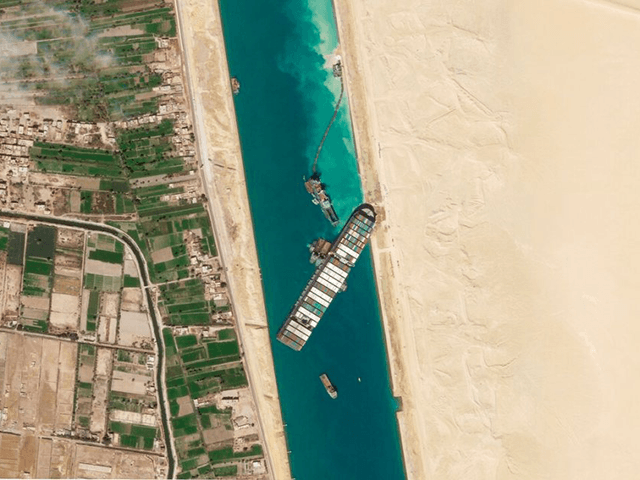Chinese state media on Monday used the blockage of the Suez Canal to propose trade routes across land established by China’s Belt and Road Initiative (BRI) as an alternative to maritime shipping.
“Despite the logjam in the Suez Canal caused by a massive container ship that got stuck in the key waterway, traders in China have seen a limited impact on their operations, with many turning to more reliable alternatives such as China-Europe freight train service to take much-needed goods from factories in China to the European market,” China’s state-run Global Times boasted.
The article quoted “industry insiders” who said demand for long-distance rail service between China and Europe saw a “surge in demand, with shipping rates rising by 10-20 percent in some cases,” because “clients are seeking stable and safe options to secure their deals.”
The Global Times admitted that fully replacing maritime transport with rail service is “not feasible,” because the biggest ships carry thousands of shipping containers, hauling as much cargo as 50 or more trains.
Instead, Belt and Road trains were suggested as a “viable option” for “those in value-added businesses like electronic devices and virus prevention items.” Proposed Arctic shipping routes could also “be a shortcut in the future that would offer more options and shorten delivery time,” according to the Global Times’ “experts.”
On Tuesday, the Global Times applauded Chinese producers and their customers in Europe for adapting quickly to the Suez Canal blockage with diversified sea, air, and land shipping networks.
“It was yet another test, following the COVID-19 [Chinese coronavirus] pandemic, of the resilience of supply chains in China,” the Communist paper declared.
This second editorial was largely dedicated to reassuring nervous customers in other parts of the world that Chinese supply chains can adapt to disruptions such as the Suez crisis:
While the actual fallout of the canal blockage is unclear, sources at several domestic businesses told the Global Times that they experienced few problems, although they did have to scramble to ensure that much-needed goods ranging from electronic devices to toys and other items got to European destinations.
In many cases, they used other shipping options including the China-Europe cargo train service or ships that detour at the Cape of Good Hope in South Africa.
“The EU [European Union] has 103 product categories where it relies heavily on China, including electronic products, chemicals, minerals, metals, drugs or medical products in strategic industries,” the Global Times pointed out, citing research from 2020.
The Global Times pointed to this dependency and dismissed “easy talk about diverting supply chains from China to elsewhere,” instead advising foreign customers to develop more flexible transportation networks to obtain their cheap goods from China.

COMMENTS
Please let us know if you're having issues with commenting.